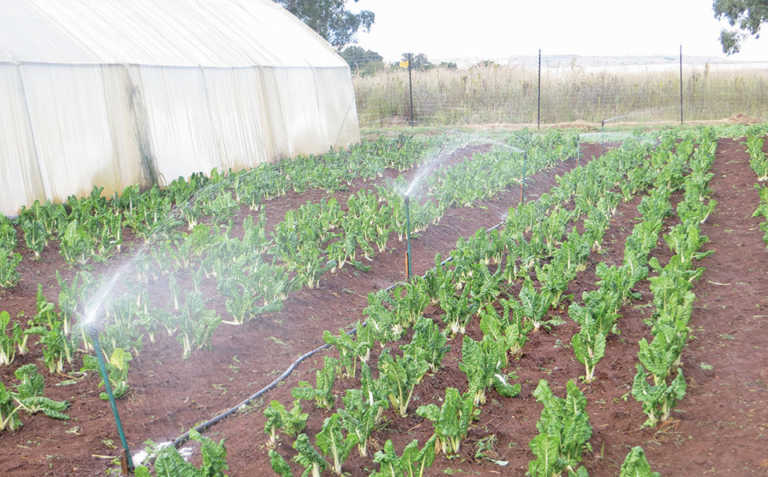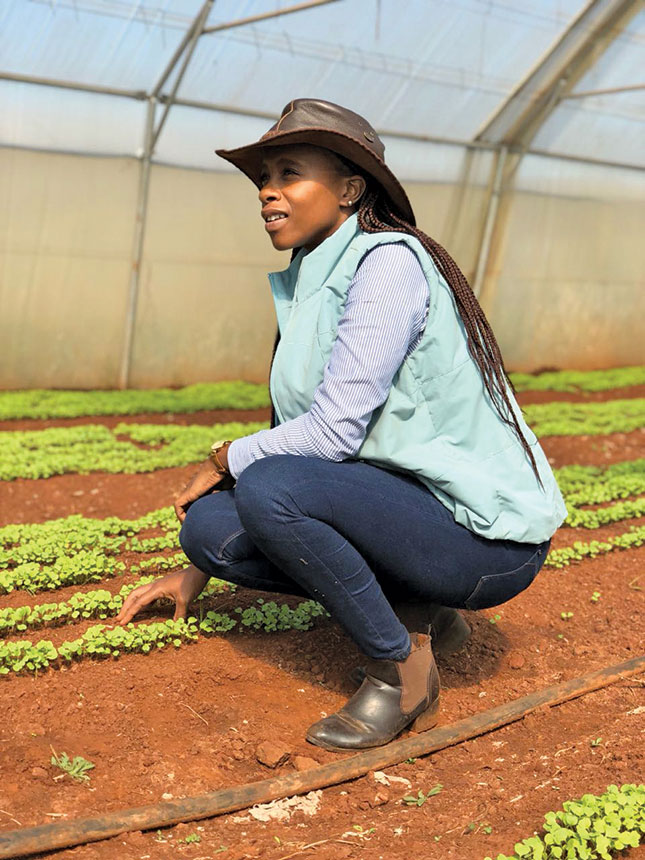
Photo: Siyanda Sishuba
When asked what she puts her success down to, Mbali Nwoko, who launched her Green Terrace crop farming business in 2016, says her curiosity and determination to farm enabled her to create partnerships in the sector. These have ensured a bright future for her young business.
The road to farming
Before pursuing a career in agriculture, Nwoko was the co-founder and managing director of a recruitment agency. In 2016, just three years after starting the business, she made a drastic career change after being introduced to farming by a friend who had also recently started his own farming business.
READ From novice farmer to successful tunnel producer
In addition to learning about his operation, she discovered that there were opportunities for new entrants in agriculture, and so began carrying out her own research. She then registered her own farming business, and her search for land started.

“Based on the research I’d done, I decided to start by growing spinach, for which there seemed to be a ready market. I had to provide the start-up capital myself because I had no luck accessing a loan from financial institutions,” she recalls.
In May 2016, Nwoko managed to find a 100ha plot in Heidelberg that she could lease for her business.
“Once I found the land, I was ready to start ploughing and learn other things on the job,” she says.
She was soon taught the first of many hard lessons: after only one month of leasing, relations between herself and her landlord’s relatives soured, forcing her to look for an alternative.
“I’d already ordered 40 000 cabbage seedlings, 20 000 spinach seedlings and 16 000 mixed pepper (green, red and yellow) seedlings, which had to be planted in July and September, so I couldn’t waste any time,” she says.
With only a one-month window in which to locate a new site, Nwoko started searching in the Boksburg area near Spruitview, east of Johannesburg, where she had grown up.
This time, luck was on her side: she met her current landlord, Beauty Aphane, whom she refers to as Mam’ Beauty, who farmed on a 14ha plot near Vosloorus. According to Nwoko, Mam’ Beauty started farming in 2013, and required a tenant for a portion of the land she was not using.
“Mam’ Beauty has been such a supportive landlord; I don’t think I’d be where I am today without her understanding and patience. She understands farming and the challenges that come with it,” says Nwoko.
Establishing the business
According to the lease agreement, Nwoko is entitled to use the equipment and some of the existing infrastructure on the farm; this includes a tractor, plough, tunnels and irrigation equipment.
These had all been purchased previously with assistance from the Department of Agriculture, Forestry and Fisheries, although Mam’ Beauty had also invested some of her own money in the business.
When Nwoko first started cultivating the land, she took soil samples to the Agriculture Research Council, who supplied her with a list of suitable crops. Fortunately, the seedlings she had ordered were all included on the list.
READ Succession: are you and your farming business ready?
She then approached a fertiliser company based in Bryanston, Sandton, which put her in contact with an agronomist, who in turn advised her on a fertiliser and planting programme.
For her first planting cycle, she planted spinach in July, cabbages in August and peppers in September with the help of Mam’ Beauty, who allowed her to use her labourers and even assisted with the planting.
She also made friends with experienced neighbouring farmers, who helped and advised her.
“When you’re a female farmer, it’s difficult for male farmers to open up to you, but I kept asking for help until they offered me assistance,” she says.
This included information on farm management, farmworker wages, and weather patterns.
Nwoko says that by mid-August her landlord had seen her determination and, wishing to retire, offered her a 10-year lease on the entire farm.
With more land at her disposal, she planted pepper seedlings in one of the tunnels, and soon expanded to six of the 10 tunnels.
Today, Green Terrace grows a variety of crops such as spinach, green peppers, baby marrow and green beans, which are supplied to leading retailers such as Food Lover’s Market, as well as the Johannesburg Fresh Produce Market.
Nwoko says that she has reinvested most of her profit in the farm, where it has been used to construct a packhouse, as well as to repair the tunnels.
Food Lover’s Market
In September 2016, when her first round of crops was almost ready for harvest, Nwoko attended a farmer’s day at the Johannesburg Fresh Produce Market.
Here she met a senior representative from Food Lover’s Market and told him about her business. She followed up with an email, providing details of her crops and how much of each she was producing.
READ Cultivar branding: a game changer for growers
Food Lover’s Market responded by arranging a farm visit by a senior buyer and their group head of sustainability, Andrew Millson.
“When they visited the farm, they asked about supplier requirements such as a refrigerated truck, a packing house and whether I had any certification standards in place, which I didn’t,” Nwoko recalls.
“My only vehicle for delivery was my father’s friend’s van. Despite these challenges, I was able to reach an agreement whereby I would supply Food Lover’s Market with 300 bunches of spinach a day. I could supply 3 500 bunches a week, so I also started supplying the hawkers’ market in Katlehong with spinach at R10 a bunch.”
Millson also put her in touch with Solidaridad, an international organisation committed to the development of socially and ecologically responsible supply chains.
This in turn connected her with the LIMA Rural Development Foundation, which sent an agronomist twice a week to provide free technical assistance.
In late October 2016, Nwoko started supplying other retail outlets with spinach and peppers.
By this time she was supplying 2 000 bunches of spinach a week.
“The peppers were the most difficult to farm, as they’re so sensitive. We also had whiteflies. But I continued asking advice from the agronomist,” she says.
To irrigate her crops, Nwoko uses drip irrigation on 7ha of land.
Challenges and lessons
“Of the 40 000 cabbages planted during that first year, I was unable to harvest anything due to excessive rains and poor employee management in August,” Nwoko recalls.
“I also had challenges with bollworm, and even though we applied insecticide, due to the rain it didn’t work.”
“I learnt several lessons after I’d finished my first year and started preparing for my second rotation. These were: always plan ahead; have a five-year crop rotation plan so that you plant on time; and order seeds in advance to meet supplier demand.”
Financing difficulties faced by new farmers
Nwoko says that government and the commercial sector need to establish better, more accessible financing and funding models for new farmers.
“Despite doing everything I could to supply only the best produce, find markets and establish cash flow, it was still difficult to acquire funding for working capital to grow my business.
“With the support of a few mentors, I’ve now established my own way of farming. I’d like to be a modern farmer and use more technology to improve my yields, which requires me to train and empower my workers in the use of such technology.
“I also intend to create a household brand for my business with the help of digital marketing platforms and social media, and I want to serve as an example to other upcoming farmers.”
Email Mbali Nwoko at [email protected].









